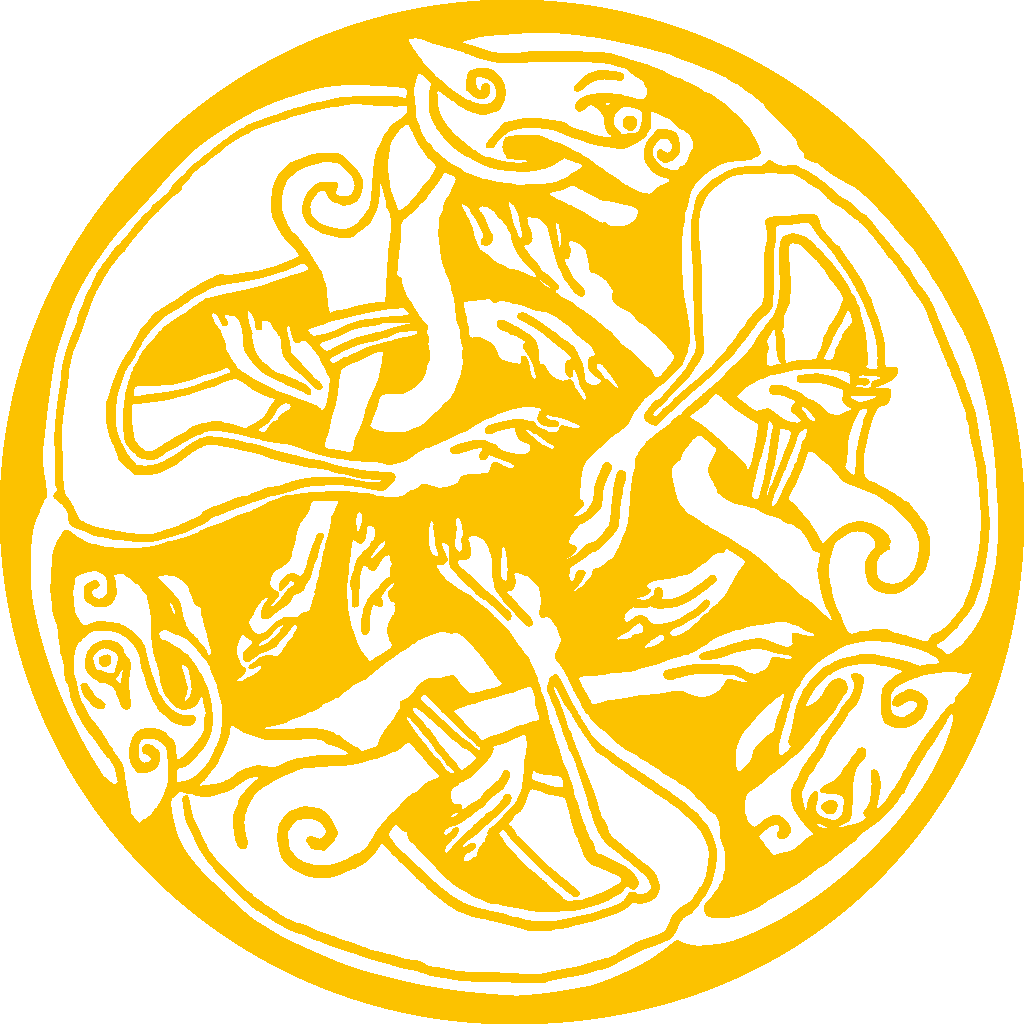Bruiḋean Ċaorṫainn - The Hostel of Rowan
The following story has many manuscript editions, so the English and Irish versions differ slightly, since Joyce and Piarais were forced to combine three well-preserved manuscripts into one. But wording does match exactly in most places, and the content is the same.
| Irish | English |
|---|---|
| 1. | 1. |
| Árd-rí uasal oirḋearc do ġaḃ flaiṫeas agus forláṁas ar ċeiṫre treaḃaiḃ Loċlann, dar ba ċoṁ-ainm Colgán Cruaiḋ-Armaċ, mac Daṫċaoin Trém. | Once upon a time, a noble, warlike king ruled over Lochlann, whose name was Colga of the Hard Weapons. |
| Do comóraḋ aonaċ agus árd-oireaċtas leis an ríġ sin aon de laeṫiḃ ar ḟaiṫċe a ḋúna agus a ḋeaġ-ḃaile féin, i gcaṫraiġ na Beirḃe Loċlannaiġe, do dtángadar maiṫe agus mór-uaisle Loċlann i n-a ċomne agus i n-a ċoṁ-ḋáil ann; agus ar mbeiṫ i n-ionad aon ḃuiḋne ḋóiḃ do laḃair an rí de ġuṫ árd-ṁór ṡolus-ġlan, agus is é aduḃairt :- | On a certain occasion, this king held a meeting of his chief people, on the broad, green plain before his palace of Berva. And when they were all gathered together, he spoke to them in a loud, clear voice, from where he sat high on his throne; |
| "A árd-ṁaiṫe Loċlann, ó ṫárla d'aon láṫair siḃ, innsiḋ ḋam an aiṫnid daoiḃ loċt ná aineaṁ orm féin mar ríġ agus mar ró-ṫiġearna." | - |
| Aduḃradar an sluaġ uile d'aiṫeasg aoi ḟir naċar ḃ'ḟeasaċ dóiḃ féin loċt ar biṫ air. | - |
| "Ni haṁlaiḋ sin daṁ-sa," ar Rí Loċlann: "'is aiṫniḋ dam loċt mór orm." | and he asked them whether they found any fault with the manner in which he ruled them, and whether they knew of anything deserving of blame in him as their sovereign lord and king. |
| "Cread é sin, a árd-rí?" ar siad-san. | They replied, as if with the voice of one man, that they found no fault of any kind. |
| "Atá," ar sé, "Rí na nOileán ḃeiṫ dá ġairm díom agus gan na hoileáin uile agam." | Then the king spoke again and said, "You see not as I see. Do you now know that I am called King of the Four Tribes of Loċlann, and of the Islands of the Sea? And yet there is one island which acknowledges not my rule." |
| "Cia an ċuid atá uait, nó naċ ḃfuil agat díoḃ, a árd-rí?" ar siad. | And when they had asked which of the islands he meant, he said — |
| "Éire iaṫ-ġlas oileánaċ do ḃí ag mo ṡeanaiḃ agus ag mo ṡinnsearaiḃ roṁam," ar se; "agus fuaradar mórán uilc ag á cosnaṁ ar a n-eascáirdiḃ; óir is ag troid ar son na hÉireann do ṫuit Balor Béimneaċ le Luġaiḋ Lám-Ḟada, agus sluaġ do-áirṁiġṫe. I gcionn bliaḋna i n-a ḋiaiḋ sin ṫug Breas, mac Baloir, caṫ do Teaṫaiḃ Dé Danann ar Ṁaiġ Tuireaḋ, agus is ann do ṫuit Breas féin, Iarann agus Slánaċ, ḋá inġin Ḃaloir uí Néid, agus a ḃainċéile, Ċeitleann, ar ṫaoiḃ ṫuaiḋ de Ṁaiġ Tuireaḋ." | "That island is Erin of the green hills. My forefathers, indeed, held sway over it, and many of our brave warriors died there in fight. There fell the great king, Balor of the Mighty Blows; his son Bres also; and his queen, Kethlenda of the Crooked Teeth; there, too, fell Irann and Slana, sisters of the king ; and many others that I do not name. But though our hosts at last subdued the land and laid it under tribute, yet they held it not long; for the men of Erin arose and expelled our army, regaining their ancient freedom. |
| "Créad do b'áil leat a ḋéanaṁ, a árd-rí?" ar siad. | - |
| "Baḋ ṁaiṫ liom," ar sé, "dul go hÉirinn dá hargain agus dá cur fá smaċt agus fá ċíos agus ċáin dam féin agus do ċloinn mo ċloinne go foirċeann an ḃeaṫa; do ġlacaḋ mo ċiosa agus mo ċána agus m'eineaċlainne uaiṫi ar ais nó ar éigean; agus d'ḟaġáil braiġead agus giall re coṁall dam go huṁal as sin amaċ." | "And now it is my desire that we once more sail to Erin with a fleet and an army, to bring it under my power, and take, either by consent or by force, the tributes that are due to me by right. And we shall thereafter hold the island in subjection till the end of the world." |
| Aduḃairt maiṫe Loċlann go raḃadar féin sásta fo leor leis an gcoṁairle fuaradar, agus gur ḋoiliġ leo a ḟaid godtugadar an turas soin. | The chiefs approved the counsel of the king, and the meeting broke up. |
| Is annsoin do ċuir Rí Loċlann gairm agus coṁ-ċruinniuġaḋ ar ṡluaiġtiḃ agus ar ṡoċraidíḃ Loċlann uile; go raḃadar seaċt ruaḋ-ċaṫa ró-ṁóra ar ḟaiṫċe na Beirḃe. Do ṫugadar sruṫ-léim ṡanntaċ ṡiuḃail san ḃfairrge ḃfíor-ḋioṁin ḃfliuċ-ṫonnaiġ le n-a longaiḃ deaġ-ċumṫa béal-leaṫana | Then the king made proclamation, and sent his swift scouts and couriers all over the land, to muster his fighting men, till he had assembled a mighty army in one place. |
This page is a work in progess.
English taken from Old Celtic Romances by Patrick Weston Joyce. Irish taken from Bruiḋean Ċaorṫainn: Sgéal Fiannaiḋ-Eaċta by Pádraig Piarais
